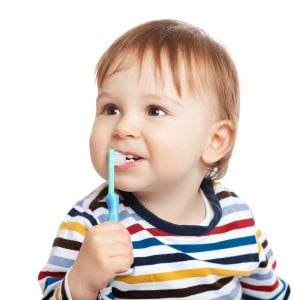 Babies suck on pacifiers, their thumbs and fingers when they want to comfort themselves. The thumb-sucking action helps to calm and secure them, just as it does when they suck on a bottle. Ideally, they should stop sucking fingers or thumbs before they begin school. The reactions of their school mates often cause children to stop sucking if this habit has persisted.
Babies suck on pacifiers, their thumbs and fingers when they want to comfort themselves. The thumb-sucking action helps to calm and secure them, just as it does when they suck on a bottle. Ideally, they should stop sucking fingers or thumbs before they begin school. The reactions of their school mates often cause children to stop sucking if this habit has persisted.
When Can it Affect My Child’s Teeth?
Look for a persistent thumb-sucking habit to affect your child when their permanent teeth begin erupting. That is, they should have begun losing their baby teeth already at which age, they’re already in school.
If you’re concerned about your child’s thumb-sucking habit, look at their teeth. If you think they might be getting displaced by the thumb and actual sucking action, ask your family dentist. He can help you determine if this is really happening.
Why Do Children Suck Their Thumbs?
Past infancy, children might continue thumb-sucking as a habit. They might also be experiencing anxiety or a need for comfort. Some children suck their thumbs or fingers if they’re feeling insecure about themselves or something that’s happening. When they’re in that moment of fear or anxiety, they pop their thumbs into their mouths. They might do so out of instinct. Remember, this action helped them self-soothe when they were infants.
For some children, thumb- or finger-sucking is actually a habit they fall into. Look at your child. Do they suck their thumb when they’re reading, watching television or when they’re feeling bored? If so, you’ll need to find ways of helping them to stop this behavior.
How Does Thumb-Sucking Affect Your Child’s Tooth Placement?
Depending on how hard your child sucks their thumb, they can actually reshape their jawbone. Remember, their bones are still soft at their age. As their thumb rests in their mouth and in between their teeth, it interferes with the placement of the teeth on both upper and lower jaws. Persistent thumb-sucking can also affect how their palate, or the roof of their mouth grows.
Their upper teeth begin tipping upward and flaring out; the lower teeth start to move inward because their tongue usually covers them. Casually ask the child to put their teeth together and grin at you. If they’re already in school and still sucking their thumb, you’ll notice a vertical and horizontal gap between their teeth. They’ll develop either an underbite, where the lower jaw sticks out or an overbite, where the upper jaw sticks out.
Ask your dentist what he and an orthodontist would have to do to correct tooth placement and improper bone growth. This could involve orthodontic braces as well as a device to help widen your child’s palate.
Good Ideas to Help Your Child Quit
- Offer to work with them to stop the thumb-sucking;
- Reward daily progress with a system of incentives or rewards;
- When you catch them not sucking their thumb, give them praise;
- Help them to deal with any negative feelings that cause their thumb-sucking;
- Tape a sock onto their hand at bedtime.
Work with your child to help them stop that thumb-sucking habit. They may want to quit just as much as you want them to do so.
Peter Wendt is a Texas blogger who recently had to deal with the repercussions of his daughter’s thumb sucking habit — she had to go to the orthodontist. During this process, Wendt decided to share what he learned about children and thumb sucking.
